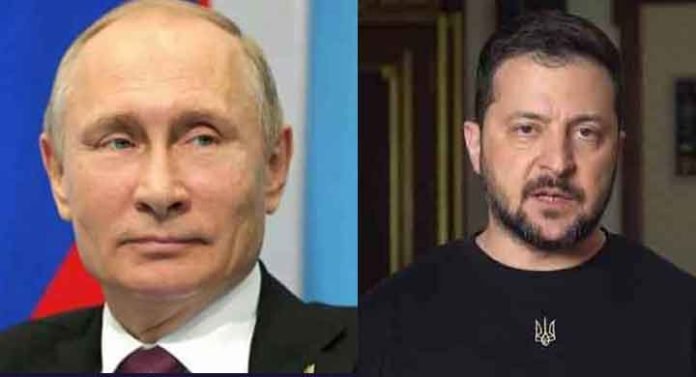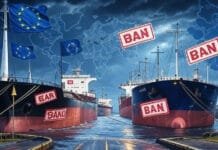Short Description – Explore the ramifications of Russia’s unprecedented land loss since World War 2 as Ukraine counters the occupation. Discover the implications of President Putin’s threats,
‘s peace proposals, and the shifting dynamics in Eastern Europe.
Expansion
For the first time since World War II, Russia lost land, a seismic shift in the geopolitical landscape that has left many scratching their heads. Over the past two and a half years, Russia has occupied a staggering 1 lakh square kilometers of Ukrainian territory—around 18% of Ukraine’s total land. But in a remarkable turn of events, Ukraine has begun a counterattack, reclaiming one percent of Russian territory, a situation that has ignited fury in the Kremlin. President Vladimir Putin, feeling the pressure, has issued stark warnings against Ukraine and NATO, stating they’ve “decided to terrorize our country.” So, what does all this mean for the future of both nations and the international community? Let’s dive in!
A Brief Overview of the Conflict
Background of the War
The conflict between Russia and Ukraine didn’t emerge overnight. Tensions had been simmering for years, driven by historical grievances, national identity, and geopolitical maneuvers. In 2014, Russia’s annexation of Crimea marked the beginning of an escalated conflict that eventually led to a full-scale war in February 2022.
Russia’s Territorial Gains
Initially, Russian forces made significant territorial gains, seizing vital areas of Ukraine. Their strategy was aggressive and seemingly effective, with an early occupation of major cities and regions. The captured land not only provided strategic advantages but also demonstrated a show of force to the West.
The Counteroffensive
However, Ukraine’s response has been nothing short of extraordinary. With the support of NATO allies, Ukraine launched counteroffensives, reclaiming territories and inflicting losses on Russian forces.
Russia’s First Land Loss Since WWII
A New Reality
As Ukraine continues to push back, the loss of Russian territory marks a significant milestone. For a country that has expanded its borders through conflict since the end of World War II, losing land is uncharted territory. This shift has left many analysts questioning Russia’s military strategy and future ambitions.
- Historical Context: The last time Russia faced such a situation was during the fall of the Soviet Union, when numerous republics gained independence.
- Psychological Impact: This loss could weaken the morale of Russian troops and civilian support back home, creating further instability within Russia.
Putin’s Response
In response to these developments, President Putin has adopted a confrontational tone. His remarks reflect a blend of frustration and determination, asserting that Ukraine and its NATO allies have crossed a line. He claimed, “We have no choice left… Our enemies will be destroyed.” This rhetoric signals that the Kremlin may escalate its military efforts rather than retreat.
The Strategic Implications of Ukraine’s Counteroffensive
Ukraine’s Gains
While the reclamation of one percent of Russian territory may seem minor, it carries monumental significance:
- Moral Victory: It boosts the morale of Ukrainian forces and civilians, providing a narrative of resilience and defiance.
- International Perception: Ukraine’s ability to reclaim land challenges the perception of Russian invincibility, galvanizing international support.
Future Offensive Plans
Ukrainian President Volodymyr Zelensky has offered a temporary ceasefire, particularly in the Kursk region, suggesting a willingness to negotiate peace. However, he has firmly stated that any peace deal must involve Russia returning all disputed areas, including Crimea. This position could pave the way for a complex negotiation process but also sets the stage for further conflicts.
The Exhibition of Military Might
Russia’s Military Showcase
Amidst these tensions, Russia hosted an exhibition at the Moscow Army 2024 International Expo, showcasing tanks and armored vehicles captured from NATO and Ukraine. This exhibition serves multiple purposes:
- Domestic Propaganda: It aims to bolster national pride and project strength to Russian citizens.
- Intimidation Tactics: By highlighting their military capabilities, Russia hopes to deter further aggression from Ukraine and its allies.
The Global Response
Internationally, reactions to the exhibition have been mixed. While some nations see it as an indication of Russia’s desperation, others view it as a concerning escalation. NATO’s response will be critical in shaping future dynamics.
A Complex Web of Accusations
Zelensky’s Offer and the Response
Zelensky’s offer for peace and cessation of attacks on Russian territories is a strategic move, attempting to position Ukraine as the peacemaker. He stated:
“We need to resolve this matter through negotiations, not through more bloodshed.”
However, Zelensky’s willingness to negotiate hinges on Russia’s acknowledgment of Ukraine’s sovereignty over its territories.
Putin’s Reaction
Putin, on the other hand, has dismissed Zelensky’s peace deal as a facade, insisting that NATO’s involvement in the conflict is a direct threat to Russia’s national security. He has labeled NATO as a terrorist organization, intensifying anti-Western sentiment in Russia.
The Role of NATO and the U.S.
U.S. Involvement
Interestingly, the White House has acknowledged that Ukraine did not inform the U.S. before launching the attack on the Kursk region. This revelation has sparked debates regarding the level of control and coordination between Ukraine and its Western allies. White House Press Secretary Karine Jean-Pierre commented:
“While we support Ukraine’s right to defend itself, we were not notified prior to the attack, which raises questions about future engagements.”
Conspiracy Theories
Russia has seized upon this development to claim that the U.S. and NATO orchestrated the attack as part of a broader conspiracy against Russia. This narrative feeds into existing fears and justifications for heightened military action.
Frequently Asked Questions (FAQs)
What does Russia’s loss of land signify?
Russia’s loss of land signifies a crucial turning point in the ongoing conflict, marking the first time since World War II that Russia has lost territory due to military defeat.
How has the international community reacted?
The international community remains divided, with some countries supporting Ukraine’s sovereignty and others expressing concern over escalating tensions with Russia.
What is Ukraine’s long-term strategy?
Ukraine aims to reclaim all occupied territories through a combination of military action and diplomatic negotiations, while also securing continued support from NATO and Western allies.
What role does NATO play in this conflict?
NATO has been a key ally for Ukraine, providing military support and supplies, while also facing criticism from Russia, which accuses NATO of aggression.
Conclusion
As we navigate through this evolving conflict, the implications of Russia losing land for the first time since World War II are profound. The dynamics of Eastern Europe are shifting, with Ukraine demonstrating resilience in the face of overwhelming odds. President Putin’s threats signal a potential escalation, while Zelensky’s calls for peace highlight the complexities of negotiation in wartime.
The road ahead is fraught with uncertainty, but one thing is clear: the landscape of international relations is changing. With every piece of land contested, the stakes grow higher, and the world watches closely as these two nations grapple for control over their futures. Will peace prevail, or are we on the brink of a more significant confrontation? Only time will tell, but the narrative of loss, defiance, and the fight for sovereignty continues to unfold.















